#or is this supposed to be “seperate the character portrayed from the actor” thing when it's actually really hard to do so in this case
Explore tagged Tumblr posts
Text
I'm just so fucking drained...
I don't think you need to know the reason why, do you?
#i'm not going to out any names but i have online friends on both ends of this debate#and i'm torn but not for the reason you think#i definitely know my stance on the situation#but it's everyone else i'm worried about#do they not know? do they not see? or do they not care?#or is this supposed to be “seperate the character portrayed from the actor” thing when it's actually really hard to do so in this case?#like istg i'm at my wits end from both sides. the situation is just terrible all around and I think its affecting my sanity#i'm going to need to do some heavy self indulgence fandom shit to get rid of the nauseating feeling i have inside#i've already had enough for one night#i'm not really in a good headspace right now and idk who to turn to cause everyone's up in arms (rightfully so)#i think my mental health is screwing up again. help me#lefty's rants and rambles#lefty talks about wrassling
4 notes
·
View notes
Text
Not to interrupt but I would like to add two small things to the points you raise.
1) What foreign colonisers have done is not our fault - especially when you take into account the fact that we were also enslaved during the same time period and faced countless attempts of cultural erasure and extermination by the Ottomans - as well as Western Nations who either came to steal from us or to even destroy our monuments. Therefore, their actions should not dictate how we are seen or how we are treated.
While I honestly feel very sorry for what you've been through and how our culture has been used against you, we aren't guilty of their (your colonisers') crimes and they do not represent us.
We deserve respect and proper representation, like any other ethnic group in the world.
There have been continuous attempts by the West to seperate our heritage from us with one of the latest being blantaly rejecting and mocking Greek people and, more specifically, Greek actors when they seek to partake in depictions of our myths and overall culture in modern media.
Example A:

This is Katerina Vrana. She is a very talented and accomplished Greek actress - comedian who, at one point, auditioned for the role of a slave girl in the movie Troy. The role had a total screen time of maybe 5 seconds, in total. Still, Katerina was rejected - despite being the only Greek to audition - for, as she was told, not looking "Greek enough".
What did they mean by that? That they wanted someone more stereotypically dark - like Salma Hayek, as Katerina herself noted.
The funny part? All main roles - as we all know - are played by light-skinned, light-featured actors of Germanic, Anglo-Saxon etc descend.
Do you see the absurdity? How the West treats us?
Example B:

This is Nikos Psarras. An incredible actor - and our national uncle after his latest portrayal of Kanellos Laskaris in the series Magissa (The Witch) - who also got rejected from Greek roles for not looking "Greek enough".
He spoke of his experience during an interview. Upon hearing his experience, the journalist asked him "And what is a Greek supposed to look like?"
To which he replied (I'm paraphrasing as it's been a while since he said it and I can't find the clip) : "Apparently, shorter, darker and hairier."
There are dozens of other such examples, as I'm sure you can understand.
That being said, I'm going to leave you the link to an article I've found particularly eye-opening and which I've sent about a million times to people. I hope you find it as educating as I did.
2) Now, onto the second point. You wrote the following:

A) It's not bad in the slightest to have POC Greek characters showcased in media. However, it is important that their representation is shown in a proper context (just like with everyone else) - meaning, are they culturally Greek like Giannis Antetokoumbo and, therefore, also have ties to another ethnic group and culture that should also be showcased? Are they mixed like Marina Satti or Manolo and therefore ethnically Greek as well as ethnically from X country which should also be taken into account? What is being gained from erasing their ties to other ethnic groups and cultures and showing only their connection to Hellas? Is that not cultural erasure and failure to represent them accurately and with respect?
(Side note, while it is not Greek representation - the previously mentioned series I spoke of - Magissa - had a Greek-Nigerian actor portray one of the most beloved - and important - parts of the series. Baku was a Nigerian man who'd found himself enslaved by the Ottomans and happened to be on the same ship as our Main male character, Andrei. Long story short, Baku's cultural heritage was shown in an incredibly beautiful manner throuought the series and his tale ends with him managing to return home to his children and grandkids to which he retold all he'd lived and seen in Hellas. Apart from all that, it was quite beautiful how his relationship with other characters was shown and how they all tried to find ways to understand one another, despite following different cultural norms and speaking a different language. That, for me, at least, is proper representation).
B) I understand that you might see it differently but for us "light skin characters" don't mean anything if they don't hold ethnic Greek characteristics. Whitewashing our Gods and Heroes isn't representation for us.
C) "Would it really be so bad to have people who look like me in your game?" - The real question is, why would you want to see yourself in something that supposedly represents Greeks (Greek Gods, as I understand it - I'm afraid I don't know much about this video game so, please, correct any possible inaccuracy) when you are of Mexican descend and have no connection to Hellas, either cultural or ethnic.
Would you not rather have a piece of media that is made specifically to cater to you? Apart from the Hellenic erasure (we've covered above - "light skin" doesn't equal to "Greek" as a skin tone, in itself, is not representation), don't you find it disrespectful towards your culture and ethnic group to support the perpetuation of idealising Hellenic Mythos over your own cultural tales? Is it possible that despite your evident dislike for the effects of colonialism on your country, you've come to adopt the by-product of those values?
When people say "the Greek gods should be ethnically Greek in Hades" they mean white.
Like they literally mean that they want all the Greek Gods to be white in the game
No, they don't mean culturally, if they wanted to talk about culture they wouldn't have brought up the word "ethnicity" and equal that to race (ethnicity doesn't mean just race, it can also mean a shared tradition or shared language, so yes, POC can be ethnically Greek if they had lived all their lifes there)
And it's so silly because like, oh, then Chaos isn't "greek" either because they're Grey and there aren't any actual Grey Greeks?
Also they're Gods! They can be anything they want, like sure, Zeus can be a swan and that's fine, but if he was a man with dark skin, that's too much?
They aren't criticizing the cultural hegemony the US has, they're just being racist and then masking their racism with "progressive" language
And then people here go and be like "Oh, poor little white people!! They have a right to demand a game without POC because it's their culture!!!"
Like what?
I'm sorry but you do remember that Greek mythology has been used, and is still being used as far right propaganda?
Like do you remember that the protagonists of the games are white and green eyed (on one eye) and the only POC are on secondary roles!?
(There can be a valid criticism about cultural hegemony in Hades, but this, isn't that)
#As someone already said - Greeks seeking proper representation should not be controversial#It's beyond tiresome to live in a world that constantly uses us and our heritage and offers us nothing in return#We are used to it by now but it's still disappointing
176 notes
·
View notes
Text
submission:
Okay so I learn something new: I thought Inuit, Native Americans are “one race”: They’re the indigenous people of America. They came from Asian lands thousands years ago through the Bering Strait when it’s frozen, and lived in the American lands ever since. That’s why I thought they were the “same” race, but different tribes. Thank you.
I also notice that there are “racial” / “national” politics. Indonesians might look like Malaysians since we are from the same “race”, Melayu, but we have a quite bad relationship towards each other, and I’m pretty sure if Hollywood cast an Indonesian actor to play a Malaysian role, there’d be protest here. And I do know that South Korea, Japan, and China have issues against each other, due to geographical issues or historical issues.
But, I seriously don’t know that there’s a political issue between Native Americans and Inuit people. My bad.
And she brought up Chinese actors getting Korean roles, isn’t that nationality (like you said about Hugh Jackman)? The actor is gonna be an (East) Asian guy, right? It doesn’t matter if he’s playing a Chinese/Korean nationality. Or is this where national politics comes in?
Regarding your take about races in ATLA, does that mean you approve that some roles will go to White actors?
The producers said the nations are inspired from these countries:
Air Nomads: Tibetans. Water Tribe: Inuit people. Fire Nation: Japanese. Earth Kingdom: Chinese.
Although there are no Tibetans or Japanese characters, I really feel that the roles should go at least to the proper “race”. I feel the reasoning “animation characters have no race” is often used by producers to whitewash the cast (can we even call it whitewashing when the supposed roles don’t have a race?)
But at this point, I don’t know what’s proper anymore. I don’t even know what’s a race, a tribe, or a nationality.
Is it wrong to cast a Korean for a Chinese role because of the nationality?
I googled that there’s 56 ethnic groups in China. What if the role was a Han Chinese, and the actor was Uyghur Chinese? Is that also wrong? What if the actor was a White dude who was Chinese since birth because his parents changed their nationality to Chinese? Is it still okay?
Sorry for the dumb questions, but I really appreciate your answers. And sorry if I interpret your answers incorrectly.
DW: Honestly, I don’t know if there are issues between Native American peoples that would make it a problem for someone of one group to portray someone from another group. There may be, but I have no idea.
As for Chinese and Koreans, it’s my understanding they share common ancestry, but consider themselves ethnically seperate. I may be wrong about that too!
I googled that there’s 56 ethnic groups in China. What if the role was a Han Chinese, and the actor was Uyghur Chinese? Is that also wrong? What if the actor was a White dude who was Chinese since birth because his parents changed their nationality to Chinese? Is it still okay?
To me, this is the same as the Native American question. I don’t know the answer to it. In the case of a Han Chinese role going to an Uyghur Chinese actor, then the only link I could think to do would be to ask the cultural representatives of both those communities, and take their feedback onboard. But I would say that no, a white actor shouldn’t play what is supposed to be an ethnically Chinese role.
As for the nations in ATLA, they’re inspired by existing cultures, but they aren’t those cultures, if that makes sense. Like, the Fire nation might be based on Japanese people, and fashion, and architecture, but there’s no such thing as Japan in ATLA.
So while I think that in ATLA there’s no requirement for an Inuit person to play a Water Tribe character–since the Water Tribe aren’t actually Inuit, and ATLA is not an Inuit story–but I do think the actor should look as much like the original characters as possible. Which means that they should definitely look first at Inuit actors. And they should leave the white guys out of it entirely.
12 notes
·
View notes
Text
Why I’m against a cursed child movie
This is only MY PERSONAL OPINION! Of course you can disagree, but please stay reasonable and polite :)

I guess this is a rather unpopular opinion (no hate please) as i saw a lot of people wanting a cursed child movie for the big screen, but here are the reasons why i’m not so fond of this idea:
1) There is no reason to!

When J.K. Rowling decided to make cursed child, she actively decided to make it a play. She could have easily written a new novel or made a new movie, but she didn’t. She wanted to create something new, in a new medium, she wanted cursed child to be different and special and making a film would be totally against her original idea. I can totally understand that she is fighting hard against the rumours about a movie, she wants it to be a play and we should respect that. Cursed child is different and special and in my opinion it should stay like that. We have and will get enough movies with the original franchise and fantastic beasts (what is great), but it’s time for something new and i love Rowling for her braveness to do something totally different from what she has done until now.
2) Changes and problems
It would loose a lot of it’s charme and amazingness! The story is written for a play (with a play script) and i don’t think it would work very well in a movie format.
The published script of cursed child is a theatre script. The humour, the dialouge, the structure, it’s all written for theatre. The humour in plays is not the same humour as in movies. Plays and movies are two seperate mediums and i think when they want to adapt it, they would have to change some things. They would certainly bring in more action as it’s not common to talk so much in movies as it is in plays and in my opinion it would loose a lot what i originally love so much about cursed child.

In addition it would loose it’s great artisticness. I don’t know if a lot of people are aware of this, but plays are a very artistic medium! There are dance numbers in the play, a lot of movement and cape swinging and even acrobatic parts (not that much). This would all have to go in a movie adaption, i mean you can’t have a dance number in a movie like this, it just wouldn’t work especially as a contuniation of the old movies. This would make me really sad, because these dance choreographies look so great and put you in a certain mood. They would have to cut the sorting hat a lot too (i mean they can’t make him run around in a movie can they hahaha) and the wonderful staircases etc.There is a lot more to say about the artisticness of this play, but well we have to continue.

But most important is the magic! When you watch the play and you see the fast costume changes and the magic tricks (i still don’t know for half of them how they work), it just feels like real magic! You know they can’t just use CGI to create a creature or a trick, there is no green screen. They have to be very creative with costumes and props and it all has to be perfectly trained and timed to work. And WOW does it work. It’s hard to describe, but it’s so much more fascinating to see the magic when you know they can’t use CGI. CGI can be very impressive (for example in fantastic beasts), but there is nothing more magical than to experience the magic live on stage. I can see CGI in nearly every movie nowadays, but cursed child’s magic is something special.
3)The actors


So until this point there were my general issues with a cursed child movie as such, here is why i think it really wouldn’t work when they want to get the original movie cast back.
First of all we have the problem that when they get one of them back and want it to be the official 9th movie, they would have to get ALL of the main actors back. Either you make it part of the movie series with all actors or you cast totally new actors and make the movie stand on it’s own. As they are all quite busy and as some possibly don’t want to anymore (ahem Daniel Radcliff…) or as some are already dead (e.g. Alan Rickman), this could be very difficult to pull off.
In case they would manage to get at least the main three back, there would still be some problems especially with Daniel Radcliff.
In cursed child Harry has two important nightmares with young Harry:
the one where Hagrid comes to the Dursleys and the one with Petunia and Harry at the Potter’s graves.
Well the first one is easy to solve, just take the scene from the first movie, done. But when they will do that (what they will have to, when it’s supposed to be part of the movie franchise) how do they want to make the second one? They can’t magic Daniel 11 again and recasting him is not an option either. With Jamie Parker in the play this wasn’t an issue as the audience doesn’t know how he looked like as an 11 year old, but with Daniel I’m pretty sure EVERY potterhead knows how he looks like with 11 hahaha. This simply wouldn’t work. But just cutting this scene isn’t an option either. This scene is so important for Petunia’s character, it would be a shame to not include it. Same goes for the Snape scenes, i wouldn’t have a problem with recasting Snape, but i guess many people would. And no, creepy CGI Snape isn’t an option for me, you can see when a person is really there or just CGI!

My next issue is Harry’s characterisation. Book Harry and movie Harry have some very different characterisations. In the books Harry is A LOT more flawed and a more complex character. We saw him in anger bursts destroying Dumbledore’s office completely, we saw him being totally unfair to his friends when he was under a lot of pressure and we even saw him successfully use the Crucio curse against a death eater. I love book Harry for his complexity and his flaws and i think through his flaws he is a lot more than a „fill in the blank“ stereotypical hero or „chosen one“. The movies didn’t show this very much. We didn’t see any of the important moments mentioned above and even in OotP Harry’s anger issues are more than underdeveloped.
In cursed child Harry’s anger issues and his imperfection are essential to the plot, i mean the „i wish you weren’t my son“ line, which was a very important motivation for Albus‘ actions. It was clear that Harry didn’t really mean it and that he said it in one of his typicall anger bursts (Albus was really provoking him), but as Dan’s Harry was rather portrayed as more perfect and bland, this would totally come out of nowhere. It wouldn’t fit to his Harry and i think that is a main reason why so many people think „Harry is out of character in cursed child“. Jamie Parker does an incredible job bringing book Harry to life with all his flaws and it fits to him very well. You see his anger bursts and his parental mistakes, but he is still very sympathetic and mostly you just want to hug him. I just really don’t think that this shady sight of Harry’s character would fit to the Harry characterisation in the rest of the movies. As a play it has nothing to do with the movies, so it’s totally fine and awesome to make Harry more like his book character. But in a new movie…

4) Accessibility
I get that the main argument for a movie is, that not a lot of people can see the play and i TOTALLY understand this complain! As a big theatre fan i know how hard it can be not to be able to see a show you really want to see and it’s one of the biggest problems with the medium theatre. But making a movie wouldn’t solve this problem, you still wouldn’t see cursed child as J.K. Rowling want it to be seen, you would see a different, heavily by Warner Brothers influenced version, which is not the „real“ cursed child, how Rowling created it.
Cursed child as a play is already in a visual medium, why create so many problems and change so many things just to transfer it from one visual medium into the other one?
Instead of asking and wishing for a movie (Rowling seems to be very certain that this won’t happen), we should wish for a recording of the play itself! It wouldn’t be the same as seeing it live, but it’s close enough and certainly closer than a movie.
It would still stay in it’s original form as Rowling wanted, but it could still be accessible for everyone as it’s screened in cinemas or sold on DVDs.
This already worked great with other shows such as Hamlet with Benedict Cumberbatch, She loves me, Holliday Inn etc. Although people can watch it at home or in cimema, the theatre is still full, because people know it’s different to see it live. I don’t think they would loose a lot of money in ticket sales, but would make additional money in selling the DVD.
(a girl can hope ;))
So that’s my opinion on this topic. I hope you enjoyed reading and please comment your opinion :), NO HATE please!
10 notes
·
View notes
Text
Top 25 Films of 2016
25. Blue Jay
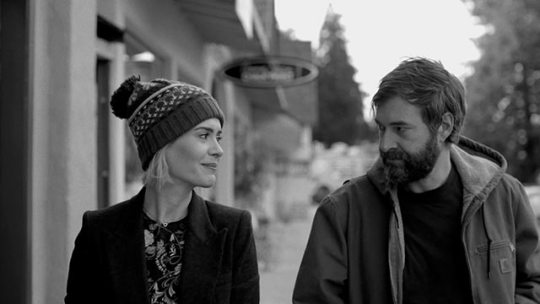
Directed by Alex Lehmann; Written by Mark Duplass
Mark Duplass and Sarah Paulson play old high school sweethearts who meet by a chance encounter two decades later in this darling of an indie film. The two actors give charming and heart-wrenching performances in a film that depicts the old kindlings of a past relationship. With a beautiful story that delves into the melancholy, Blue Jay genuinely conveys the regrets and regressed love between ex lovers.
24. Swiss Army Man

Written and Directed by Daniel Kwan and Daniel Sheinert (known as The Daniels)
Arguably the most original and authentic film to come out in 2016, Swiss Army Man gained momentum and noteriety through its peculiar, yet comedic, storyline. A man (Paul Dano) who had been stranded on an island for a presumably long time was about to end his own life until he comes across a flatulent dead corpse (Daniel Radcliffe) washed up on the beach. Starting out as a survival drama, it quickly evolved into a quirky buddy comedy as the man discovers the dead corpse’s many powers. Disturbing at times, it completely embraces its lunacy and whimsical humor, and it emphasizes the importance of imagination, which it boldly excels at.
23. 13th
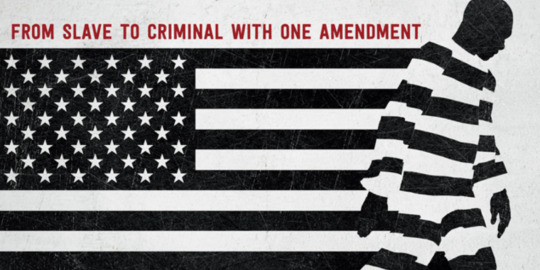
Directed by Ava Duvernay; Written by Spencer Averick and Ava Duvernay
With its controversial subject matter, this documentary couldn’t have been released at a more convenient and ironic time. In the span of The Black Lives Matter movement; to the hearing of Trayvon Martin’s shooter, George Zimmerman; and the 2016 presidential election, 13TH shook up viewers with its analysis on the thirteenth amendment and its correlation with America’s issue of mass incarceration of African-Americans. The film goes full depth into the history and business of the privately-owned prison industry and its ties in government. As alarming and concerning as these issues are, 13TH not only effictively tells the history of this dilemma, it commands one’s attention in efforts to act upon it.
22. Jackie

Directed by Pablo Larrain; Written by Noah Oppenheim
Playing the role of Jacqueline Kennedy after the assissination of her husband, Natalie Portman adds a revelatory performance to her illustrious career. Marvellously shot by cinematagrapher, Stephane Fontaine, with the eerie score from Mica Levi, the film commits its attention on the widowed first lady allowing Portman to guide the audience through the absurd and turbulent events during a time in history where paranoia and confusion were set in the hearts and minds of many Americans.
21. Silence
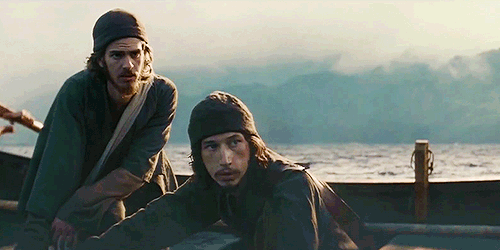
Directed by Martin Scorcese; Adapted Screenplay by Jay Cocks and Martin Scorcese
After twenty years of anticipation, auteur Martin Scorcese crafts a film that portrays theology in an alternative light in which it seperates itself from other films that center around religion. Based on the story from Japanese novelist, Shusaki Endo, Andrew Garfield plays Sebastiao Rodrigues, a Jesuit preist who decides whether to apostatize while searching for his mentor (Liam Neeson) who was captured in a Japanese village in the 17th century. Its long run time and slow pace can pose as a challenge, but its striking cinematography from Rodrigo Prieto is mesmerizing, and its unique perspective on religion emphasizes important moral questions in relation to conflicting ideologies from different cultures.
20. Paterson

Written and Directed by Jim Jarmusch
Jim Jarmusch returns with a bang with this meditative, heart-warming drama starring lead man, Adam Driver, who plays a busdriver named Paterson who lives in Paterson, New Jersey and has a profound love for writing poetry. The film delves into the heart and mind of Paterson as he encounters the many people and places while on the job and at home. It takes one on a journey through an artist’s creative process in this case Paterson’s poetry as he gathers inspiration and tranforms the subtle beauty around him into words on a page. It’s quiet, easy-going, and thoughtful, and Paterson leaves you with an appreciation for the simple things in life.
19. Kubo and the Two Strings

Directed by Travis Wright; Story by Shannon Tindle and Marc Haimes; Screenplay by Marc Haimes and Chris Butler
With a hearfelt story and its eye-dropping visuals from stop animation studio, Laika, Kubo and the Two Strings impresses on many levels. Beyond the incredible images is the story of a rebellious young Japanese boy who must make a decision that will effect his family’s legacy forever. Armed with his masterful abilities to play a two string sitar-like instrument called a shamisen and to tell stories through oragami, Kubo embarks on a journey of self-discovery that is both enchanting and enlightening -- a joy from start to finish.
18. The Salesman
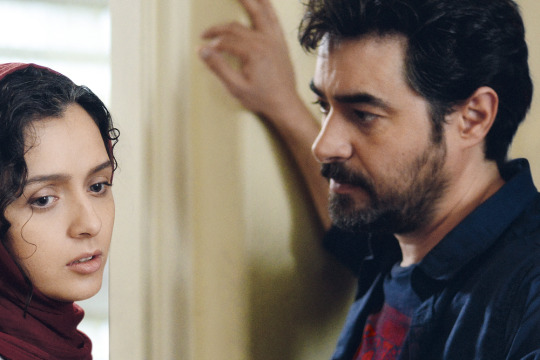
Written and Directed by Asghar Farhadi
This acclaimed dramatic thriller from the director of “A Seperation” is a little gem that sublimely blends mystery and comedy in a story where a couple experiences a traumatic event that could unravel their relationship. Being an unmarried and childless couple in Tehren, Rana and Emad are both actors and members of a theater company that is in the middle of production of Arthur Miller’s, “Death of a Salesman.” After abandoning their apartment that was about to collapse from poor infrastructure, they move into a new flat only to encounter the horrors from the previous tenant who was a prostitute. Shahab Hosseini and Taraneh Alidoosti are magnificent as the two protaganists, and the film is well-deserving of its Oscar win for Best Foreign Film.
17. Split
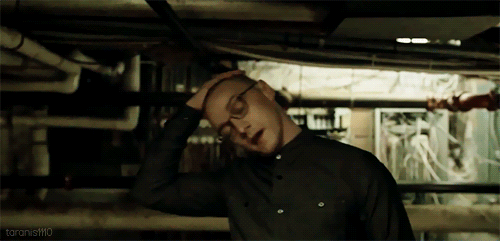
Written and Directed by M. Night Shyamalan
It’s a slippery slope when depicting a character who has dissociative identity disorder, or more commonly known as multiple personality syndrome. The argument in which the disorder is accurately portrayed remains, but as a whole, Split is a return to form for the largely polarized director, M. Night Shyamalan. Undoubtedly, the film owes its success to the audaciousness and dexterity of James McAvoy, who plays a troubled, ominous figure who struggles with DID and kidnaps three girls. The protagonist is one of the estranged girls played by Anya Taylor Joy, who is equally superb with a compelling background story. As per typical Shyamalan films, there is a reveal within the film that may pleasantly surprise his fans, but all in all, the film is entertaining with an ingenious plot and regains positive momentum for the director leading up to his future projects.
16. American Honey

Written and Directed by Andrea Arnold
Messy, beautiful, bewildering, and vibrant. British director, Andrea Arnold’s docudrama follows an abused, poor, and inquisitive female teenager who runs away from her despairing household with a crew of young and reckless kids who travel around the U.S. selling magazine subscriptions for “supposed” fundraisers. Sasha Lane and Shia Leboeuf command the helm with their graceless charm and palpable chemistry, seamlessly weaving their ways through their uncarved path to adulthood. Because it embraces a non-structural narrative format, the film strays away from common stereotypes, inviting complexities and contradictions within the characters and story. It’s a fresh take on an adventure/coming-of-age story that excludes any moral stance or agenda, refraining judgement away from the characters. It simply breathes and lives from one moment to the next.
15. Lion

Directed by Garth Davis; Screenplay by Luke Davies
Lion is an incredibly emotional film that especially tugs on the heart strings of parents. Based on the non-fiction book, “A Long Way Home” by Saroo Brierley, the film is about a young boy named Saroo (Sunny Pawar) who accidently gets lost in India and struggles to survive on his own. After going through the foster care system and growing up with foster parents in Australia, the film flashes forward couple decades where Saroo, now played by Dev Patel, discovers how to track down his biological family using Google Earth. Nominated for a three Oscars, Lion effectively hits all the right notes even if the film is a giant Google product placement.
14. Hidden Figures

Directed by Theodore Melfi; Screenplay by Allison Schroeder and Theodore Melfi; Based on the Book by Margot Lee Shetterly
Hidden Figures tells the story of three influential women who were monumental in the development of NASA in the early sixties. Very much a David versus Goliath story, three of these women had to fight their way against gender and racial discrimination in order to excel in NASA and pave the way for America’s goal to win the space race. Although it focuses on the three characters, the film’s main protagonist centers around Katherine G. Johnson (Taraji P. Henson) who calculated the launch coordinates and trajectory for the Atlas rocket. Taraji P. Henson, Octavia Spencer, and Janelle Monae star in an ensemble cast in this powerful biopic that exudes positivity and inspiration.
13. Captain Fantastic
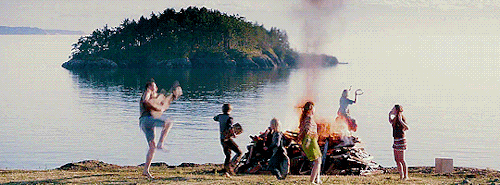
Written and Directed by Matt Ross
Probably portraying the most eccentric and ultra-progressive family in the history of film, Captain Fantastic is a stunningly ethereal adventure/fantasy drama about a radically idealistic father (Viggo Mortensen) and his six children who live an isolated life in the woods and must travel into civilization after a family tragedy had occurred. The father is an extremely well-disciplined man who rigorously teaches his kids through physical training and intense education. Because of his socialist ideals and political beliefs, he has successfully made his family into survivalists, which has lead them to a comfortable and blossoming life in the woods. His ideals are challenged when he faces the real world during their adventure into society. With a charming young cast and a phenomenal performace from Mortensen, Captain Fantastic is a remarkable, feel-good story with a philosophical outlook.
12. Nocturnal Animals

Directed by Tom Ford; Screenplay by Tom Ford; Based on the Novel, “Tony and Susan,” by Austin Wright
Drawing inspiration from Austin Wright’s 1993 novel, “Tony and Susan,” Nocturnal Animals mends elegance and style into its bloody, brutal story which revolves around the themes of betrayal, heartbreak, and revenge. Although Amy Adams is arguably underused in this role, it’s the supporting cast -- Jake Gyllenhaal, Aaron Taylor Johnson, Michael Shannon, and Karl Glusman -- who carry the film exceptionally well. From the Gucci maestro and director of A Single Man, Tom Ford combines his unique and authetic storytelling with expertly-crafted cinematography engaging the viewer into a world of sheer beauty and peril. It’s vivid and vicious, and even in its peculiar moments, the film shines exponentially.
11. Hell or High Water

Directed by David Mackenzie; Written by Taylor Sheridan
The middle of the year was hit with a bang when this wild and rambunctious thriller was released, making Hell or High Water the highest grossing indie film of the year. From the writer of “Sicario,” Taylor Sheridan composes a skillfully crafted heist story that rather than it completely embracing the Western genre, it portrays more of a humbling family drama. Chris Pine and Ben Foster play Toby and Tanner, two brothers who rob banks in West Texas in order to pay off the local banks before Toby’s farmland is seized. Jeff Bridges is remarkable as the Texas Ranger who takes on the challenge to put them into custody. This neo-Western is masterfully shot with envigorating action scenes and does not disappoint with an exceptional cast.
10. Manchester by the Sea
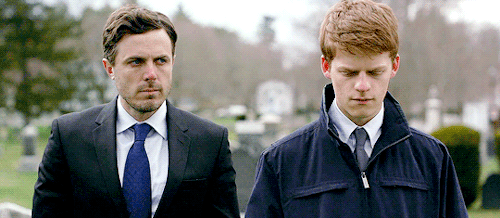
Written and Directed by Kenneth Lonergan
It takes a special film that can effectively mix humor with densly serious subject matter without being offensive or mean-spirited. Manchester By the Sea is a film that does not shy away from the irony and sarcasm that occurs when the protagonist, Lee (Casey Affleck) is chosen to become the guardian of his late brother’s teenage son (Lucas Hedges). Through a series of flashbacks interspersed throughout the film, the reason becomes clear why Lee has become a damaged man, and since he is no stranger to tragedy, he helps serve as a guide to his nephew as he comes to terms with his father’s death. A powerful yet interesting account on grief, Manchester By the Sea definitely brings the tears but also with a subtle quirkiness that softens the pain.
9. The Lobster

Directed by Yorgos Lanthimos; Written by Yorgos Lanthimos and Efthymis Filipou
Brilliantly dystopic and hilariously cynical, Colin Farrel stars as David, a lonely introvert living in the futuristic world called The City where he is enrolled into The Hotel and must find a romantic partner in forty-five days or he will be turned into an animal. The film is essentially a critique of the social norms of love in modern society. It highlights the absurdities and ridiculous behaviors within The Hotel with its dark humor and hyperbolic metaphors. With subtle acting; wonderfully crafted and complex characters along with an ingeniuous story, The Lobster impresses on many levels and provokes further thought after the first viewing.
8. La La Land

Written and Directed by Damian Chazelle
It’s an ode to old Holloywood musicals, but it’s fresh in its approach, and it simply bounces off the big screen with its sharp contrasts and hues. It is no surprise that La La Land has recieved critical acclaim and overwhelming attention since its release. It is officially tied with “All About Eve” and “Titanic” with the most Oscar nominations -- fourteen. At the heart of it is an aspiring actress (Emma Stone) and a traditionalist jazz musician (Ryan Gosling) who fall in love in Los Angeles all the while attempting to reach new heights in their artistic endeavors. It’s a classic tale about love and ambition with incredible fervor and choreographic prowess, and it adds another superb film to the list of the young phenom-director, Damian Chazelle.
7. The Handmaiden
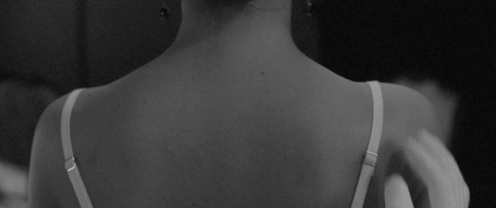
Directed by Chan-wook Park; Screenplay by Seo-Kyeong Jeong and Chan-wook Park; Based on the Novel, “Fingersmith,” by Sarah Waters
Being one of the longest films on this list, The Handmaiden masterfully grasps your attention in every scene, and it does not do so in predictable and obvious ways. From the director of “Stoker” and “Oldboy,” Chan-wook Park returns with a story filled with mystery, betrayal, and deception. Originally written as a novel titled, “Fingersmith,” by Sarah Waters, a handmaiden is hired to care after a Japenese hieress, but inconspicuously, the handmaiden has been hired to beguile her. Because of the story’s many twists and turns, it is one of the most entertaining films to watch and includes one of the most rewarding endings in a film this year.
6. Fences
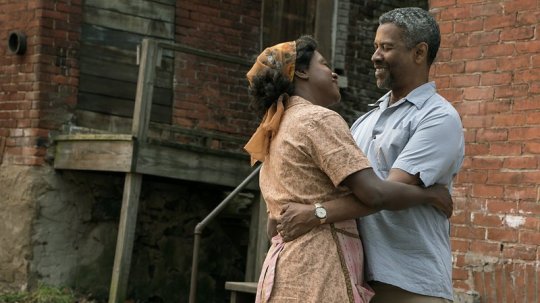
Directed by Denzel Washington; Screenplay by August Wilson; Based on the Play, “Fences,” by August Wilson
Denzel Washington and Viola Davis give a riveting performance in August Wilson’s film adaptation, Fences. Washington plays Troy Maxson, a rough-around-the-edges, loquatious working class man who must come to terms with the events in his life while raising his family in the fifties. From poverty to the Jim Crow laws and time in prison, Troy’s troubled past shapes his worldview, so much so that it escalates tension between him and his son, Cory (Jovan Adepo), who wants to play on a college football team. Although Troy commands the story, his wife (Viola Davis) is his crux and the chassis that holds the family together. This is arguably Davis’ and Washington’s best performances of their career, and because of its intense and personal moments, Fences is a humbling masterpiece.
5. Loving

Written and Directed by Jeff Nichols
Loving tells the powerful, true story of Mildred and Richard Loving, an interracial couple who were arrested in Virginia in 1958 due to anti-micegenation laws. Joel Edgerton and Ruth Negga provide a powerful performance, and their on-screen chemistry is palpable, but much of the credit goes to director, Jeff Nichols. Loving could have easily been an over-reaching Oscar bait film, badgering the viewer with maudlin, overtly sentimental material, but it is the complete contrary. Its quietness and steadfast calmness emphasize the love and passion between these two characters, which makes it an absolute treasure.
4. 20th Century Women

Written and Directed by Mike Mills
1970′s. Second-wave feminism. The Talking Heads. There were some important cultural changes occuring when a young teen named Jamie (Lucas Jade Zumann) was being raised by his mother (Annette Bening) and two other women (Elle Fanning, Greta Gerwig) in Santa Barbara, California. 20th Century Women is indeed a dysfunctional family drama, but its layered political and societal themes bring a rugged texture and complexity that emphatically ring true through its characters. The film highlights Jamie’s struggle for identity as he searches for the many forms of masculinity portrayed in pop culture all the while his mother wishes to understand his desires and protect him from self-destruction. With a mesmerizing cast and a distinct tone, 20th Century Women beautifully depicts a group of people who are striken by the uncertainty of their futures and yet manage to navigate their lives while remaining together.
3. A Monster Calls

Directed by J.A. Bayona; Screenplay by Patrick Ness; Based on the Novel by Patrick Ness
Easily one of the most beautifully shot and animated films of the year, A Monster Calls will most certainly elicit a good cry. Interestingly enough, this film appeared to be catered for young audiences, but its dark and mature subject matter seem anything but suitable for its target audience. Suprisingly, the film holds its own for its unique direction and grounded tone when dealing with a story centering around grief and isolation. While his mother (Felicity Jones) is striken by a terminal illness, a boy (Lewis MacDougall) discovers a tree monster that could help him cope with the traumatic events that have occured in his life. The film is daring in regards to showcasing the dark and somber moments from the tragedies of this young boy’s life, and it successfully entices due to its strong visual and emotional magnetism. A brilliant and poignant achievement.
2. Arrival

Directed by Denis Villeneuve; Screenplay by Eric Heisserer; Based on the Story, “Story of Your Life,” by Ted Chiang
Denis Villenueve is one of the great filmmakers of this generation, and he surely does not disappoint with his latest sci-fi drama, Arrival. Like most of Villeneuve’s work, he brings gravitas to each scene by incorporating underlying tension between characters and evoking a subtle dread and unease, which has been a signature within his filmography. Arrival embodies that gravitas except with a remarkable story and new genre in which Villeneuve has yet to explore until now -- science fiction. Amy Adams is spectacular as linguistics professor, Louise Banks, who is delt an overwhelming assignment from the federal government to deconstruct the language of alien inhabitants who have landed on Earth via twelve elliptical spacecrafts. Gorgeously shot by upcoming cinematographer, Bradford Young, it is dauntingly visceral with its high contrast and greyish midtones, but it’s the story that shines and creates a breath-taking reveal that will be relished for quite some time. Villeneuve is a master of character study, and Arrival is yet another marvelous addition to his arsenal of acclaimed work.
1. Moonlight

Directed by Barry Jenkins; Screenplay by Barry Jenkins; Story by Tarell Alvin McCraney
It’s difficult for a film to justify the hype it has recieved, and in a lot of ways, too much hype could do so much to even discredit it. There are many reasons why some art is deemed “great art,” but how “great art” moves past all the expectations is by embodying an element in which it trancends beyond its labels. A great film is a great piece of art. It acts as a vessel that propels beyond the screen and into our lives. Moonlight is that film, and it is a cinematic triumph. In its entirity, it’s seamlessly executed aesthetically, technically, and emotionally. It tells the story of Chiron who grows up gay, poor, and black in an impoverished neighborhood in Miami. The story is told in three parts: Chiron as a young child, a high-school teenager, and a man in his mid-twenties. Tragedy has followed Chiron his whole life due to his sexuality, which is harshly rejected in an area pervaded by violence and poverty. His survival is dependent upon his ability to conform all the while his mother struggles with drug abuse. Moonlight is a timeless story about love that is universal and was released in a year where the marginalized needed a voice. Well, Moonlight is that voice, and it speaks volumes over the hype.
#top25films#top25#oscars2017#top25filmsof2016#2016#arrival#moonlight#manchesterbythesea#20thcenturywomen#split#lalaland#thehandmaiden#loving#fences#thelobster#hellorhighwater#captainfantastic#nocturnalanimals#hiddenfigures#lion#americanhoney#amonstercalls#thesalesman#kuboandthetwostrings#paterson#silence#bluejay#jackie#13th documentary#swissarmyman
5 notes
·
View notes
Note
Hello, (imma fan) I'm currently writing my first story but it's a little rough. My character, who is supposed to be a small, feisty, mean-looking witch (fanatic of dragons) with a personality of steel, is becoming too much like me! She lives alone and seems like a semi-optimistic person. NOT what I intended. Later on, she gets a letter to go to the Palace where a rumored dragon lives. That's when she meets her love interest (The prince lol) the romance is supposed to be slow though. Please help!
Hello! So, to my understanding the issue is that your character is becoming too much like you. I have this problem too, and it gets to the point where my MC becomes me entirely. To prevent this, make a list of character traits. In addition, you could answer "getting to know your character" questions. Here's a link to a site: http://www.helpingwritersbecomeauthors.com/interviewing-your-characters/https://rachelgiesel.com/blog/how-to-really-get-to-know-your-characters-a-questionnaireOnce you have the personality of your character very clear and very developed, use this knowledge to keep the portrayal on track. When you suspect your MC is doing/ saying something you would do/say rather than what they would, take a quick look at your list of important things about the character. Do the actions/words correspond? If not, what does? Think about your character as if they're an actor. Are they following the script? If you, the writer, were watching a show based off of your story, would you think that your character is not behaving like themselves? You have to drill into your head that you are not living through your MC; you are creating and developing and portraying a character that is an idividual entirely seperate from you. It may help if you pretend that your MC actually exists as a real person, and you're writing fanfiction of them. P.S. Obviously, it is not a crime to write a character modeling yourself if that's what you're going for. This post is just regarding the prevention of writing a character like yourself if you'd like to. ♡I'd also like to add that your character sounds awesome!
#Writing tips#writing tip#writing advice#writing help#creative writing#creative writing help#book advice
20 notes
·
View notes